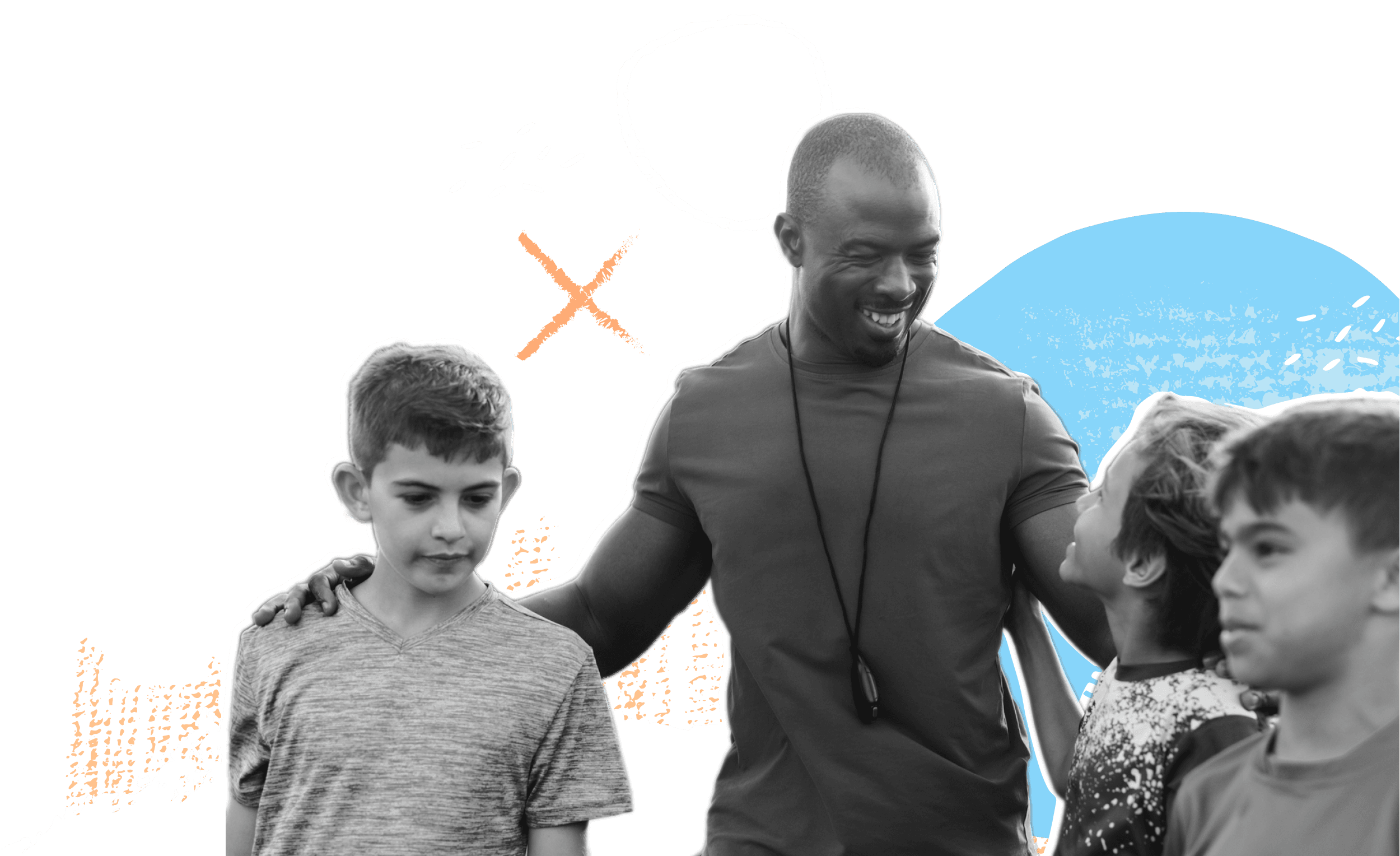What adults say to kids matters. You inspire their health and their sense of self. It’s a big responsibility, but it doesn’t have to be complex. Sometimes just knowing what to say, and feeling empowered in the small moments of each day can have a big influence.

Ages 6-10 (Elementary School Years)
“Healthy athletes come in all shapes and sizes.”
At every age, athletes compare themselves physically to others. Comparison is natural. However, comparison (especially to unrealistic images from media or to other body types that are genetically different) can quickly become detrimental to an athlete’s self-esteem and body image. Coaches have an important opportunity to be on the lookout for when their athletes’ comparing means that they are focused on what they lack – rather than their unique strengths and abilities. As a coach, you have a powerful voice: Remind the athletes you coach that they don’t have to look a certain way to be good athletes. Their shape and size are exactly how they should be.
“Food helps you grow and gives your body energy to play your best.”
Making a positive connection between food and energy is important for young athletes. Focusing on how food helps our brains and bodies grow, think, move, and stay fueled throughout the day helps athletes see food as beneficial for playing their sport and feeling their best. Research suggests that adults’ beliefs and judgments about food can impact a child’s thoughts and eating behaviors. If adults label food choices as “good/bad” or “clean/unhealthy”, it can equate food with stress or anxiety about being right or wrong. It also can cause stress for kids who live with food insecurity.
“Listen to your body. It will tell you if it’s hungry, tired, or full.”
In our society, especially as adults, we can oftentimes be disconnected from our body signals and what they mean. As a coach, you can help young athletes learn to listen to what their bodies are telling them and the value in doing and trusting what their bodies need (i.e. eating more, slowing down, or taking a break.)
“You’re good at [insert skill/attribute]. That makes you a great member of this team.”
Research has shown that coaches’ assessments of ability and intention in young athletes are important factors in the development of positive self-esteem. In relation to healthy food and body attitudes, kids who are confident and feel good about themselves are less likely to develop unhealthy eating patterns and body dissatisfaction. You can build self-esteem in your athletes by praising their uniqueness, work ethic, and skills. This helps take the focus off appearance, weight, or other factors that can be harmful to how they view themselves.
“I believe in you.”
Showing support and encouragement to your athletes can empower them to believe in themselves as well as their bodies and abilities. They look up to you, and simple words can build their self-esteem.
Ages 10-13 (Middle School Years)
“Healthy, athletic bodies come in all shapes and sizes.”
At every age, athletes compare themselves physically to others. Comparison is natural. However, comparison (especially to unrealistic images from media or to other body types that are genetically different) can quickly become detrimental to an athlete’s self-esteem and body image. Coaches have an important opportunity to be on the lookout for when their athletes’ comparing means that they are focused on what they lack – rather than their unique strengths and abilities. As a coach, you have a powerful voice: Remind the athletes you coach that they don’t have to look a certain way to be good athletes. Their shape and size are exactly how they should be.
“Food is the fuel that powers your mind and body to perform at their best.”
Making a positive connection between food and energy is important for young athletes. Focusing on how food helps our brains and bodies grow, think, move, and stay fueled throughout the day helps athletes see food as beneficial for playing their sport and feeling their best. It also helps take the focus off food in relation to body size or weight as can be portrayed negatively by media and keep it on how food creates energy for our minds and bodies to play well/have an advantage.
“Different types of food are important for your mind and body to work well each day”
Different types of foods, all in moderation, have different nutritional benefits that our minds and bodies need to feel balanced and healthy, thereby allowing us to perform at our best. Research suggests that adults’ beliefs and judgments about food can impact a child’s thoughts, food choices, and eating behaviors. If adults label food choices as “good/bad” or “clean/unhealthy”, it can equate food with stress or anxiety about being right or wrong. It also can cause stress for kids who live with food insecurity. When we focus on communicating about variety and balance, it helps athletes see different foods as positive to their growth, their strength, and their performance, and value what it can have for them.
“Your brain and body need a variety of activities to be strong.”
Athletes may feel the pressure to obsess about or overdo a certain type of exercise in order to achieve their potential. However, remind them that variety, moderation, and off-days are crucial for athletes to perform at their best. Model this value for them by letting them know how you rest and recharge.
“I believe in you.”
Research has shown that coaches’ assessments of ability and intention in young athletes are important factors in the development of positive self-esteem. In relation to healthy food and body attitudes, kids who are confident and feel good about themselves are less likely to develop unhealthy eating patterns and body dissatisfaction. You can build self-esteem in your athletes by praising their uniqueness, work ethic and skills. This helps take the focus off appearance, weight or other factors that can be harmful to how they view themselves.
Ages 10-13 (Middle School Years)
“Healthy, athletic bodies come in all shapes and sizes.”
At every age, athletes compare themselves physically to others. Comparison is natural. However, comparison (especially to unrealistic images from media or to other body types that are genetically different) can quickly become detrimental to an athlete’s self-esteem and body image. Coaches have an important opportunity to be on the lookout for when their athletes’ comparing means that they are focused on what they lack – rather than their unique strengths and abilities. As a coach, you have a powerful voice: Remind the athletes you coach that they don’t have to look a certain way to be good athletes. Their shape and size are exactly how they should be.
“Food is the fuel that powers your mind and body to perform at their best.”
Making a positive connection between food and energy is important for young athletes. Focusing on how food helps our brains and bodies grow, think, move, and stay fueled throughout the day helps athletes see food as beneficial for playing their sport and feeling their best. It also helps take the focus off food in relation to body size or weight as can be portrayed negatively by media and keep it on how food creates energy for our minds and bodies to play well/have an advantage.
“Your brain and body need a variety of foods and activities to work well.”
Different types of foods, all in moderation, have different nutritional benefits that our minds and bodies need to feel balanced and healthy, thereby allowing us to perform at our best. Research suggests that adults’ beliefs and judgments about food can impact a child’s thoughts, food choices, and eating behaviors. If adults label food choices as “good/bad” or “clean/unhealthy”, it can equate food with stress or anxiety about being right or wrong. As well, even young athletes may feel the pressure to obsess about or overdo a certain type of exercise in order to achieve their potential or meet expectations. It’s beneficial to remind them that variety, moderation, and off-days are crucial for them to perform at their best. When we focus on communicating about variety and balance, it helps athletes see different foods and activities as positive to their growth, their strength, and their performance.
“Listen to your body; it knows what’s best. Rest is important, too.”
In our society, we can oftentimes be disconnected from our body signals and what they mean. Maybe you grew up with meal times being focused on “cleaning your plate” or on how much you were eating of a certain kind of food. Research shows that learning to ignore the body’s natural appetite signals can contribute to eating and weight challenges. As a coach, you can help your athletes learn to listen to what their bodies are telling them and the value in doing and trusting what their bodies need (i.e. eating more, slowing down, or taking a break).
“I believe in you.”
Research has shown that coaches’ assessments of ability and intention in young athletes are important factors in the development of positive self-esteem. In relation to healthy food and body attitudes, kids who are confident and feel good about themselves are less likely to develop unhealthy eating patterns and body dissatisfaction. You can build self-esteem in your athletes by praising their uniqueness, work ethic and skills. This helps take the focus off appearance, weight or other factors that can be harmful to how they view themselves.



